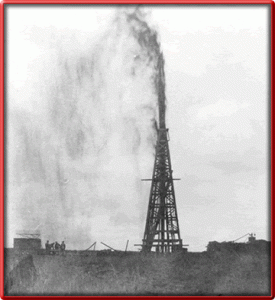CA Already Max Taxes Crude Oil
By WAYNE LUSVARDI
How “crude” of them.
Tax activists in California are pushing a deceptive “oil severance tax for public education” for the November 2012 ballot to increase funding for K-12 public schools, junior colleges and state universities. They’re calling it the “Tax Oil for Education” measure.
Tom Elias wrote a column in the Jan. 31 Hanford Sentinel, “Need Grows for ‘Tax Oil for Education’ Initiative.” He said, “One thing that hasn’t changed is that California remains the only oil producing state in America with no severance tax.”
Technically, this is only half true. Yes, California does not have an official “oil severance tax.” According to the Merriam-Webster Dictionary, an oil severance tax is defined as: “a tax levied by a state on the extractor of oil intended for consumption in other states.”
But according to economists William G. Hamm and Jose Albarro, California’s relatively high corporate income tax rate and sales tax rate on crude oil production substitute for an “oil severance tax.” It is a myth that California has a tax loophole on crude oil.
The corporate income tax rate in California varies from 15 percent to 35 percent depending on gross revenues. The California sales tax base rate is 7.25 percent on top of the corporate income tax.
Average Crude Tax
California’s taxation of crude oil is about “average” compared to the top oil producing states.
According to Hamm and Alberro’s study, “A Comparison of Oil Tax Burdens in the Ten Largest Oil Producing States,” the top oil producing states use different types of taxes on crude oil production. Some impose property taxes, some corporate taxes, some income taxes, some an “oil severance tax” and others a mix of taxes.
California is about equal with Oklahoma, Kansas, Utah, Alaska and Texas in its overall oil-tax rate. And California has a modestly lower oil tax rate than Colorado, Louisiana and Wyoming.
If California enacted a proposed 9.9 percent oil severance tax rate, the effective combined tax rate on oil it would be about 40 percent higher than Wyoming’s, which is the state with the highest oil tax rate. And California’s crude oil tax rate would be about double that of Alaska, a state with an average oil tax rate.
Moreover, neither Wyoming nor Alaska has a state personal income tax. And according to the Tax Foundation, Wyoming has the fourth-lowest tax rate of the 50 states, and Alaska the rock-bottom lowest rate. By contrast, California’s tax rate ranks 44th – that is, sixth worst.
So, Elias is wrong to maintain that California is getting away with no taxes on oil producers. But California’s crude oil tax rate is roughly equal to that of Alaska and Texas.
Gasoline Prices Won’t Rise?
Elias also maintained that “the cost of a gallon of gas will not rise noticeably because of a severance tax.”
Here Elias substituted the word “cost” for “price.” Sure, the price of gasoline might not rise at the pump if it is double-taxed by California. Elias wrote, “Oil companies still price gasoline based on their worldwide costs rather than the expense of drilling in any one locale.
That’s only partly true, as can be seen by driving over to Arizona. As of today, Feb. 1, the average price of gas in Arizona is $3.40 a gallon, while the average price in California is $3.74 a gallon. Due to higher taxes and the special formulas required for California gas, we pay 37 cents per gallon more, or 11 percent.
Elias igorned that people don’t pump oil into their cars. They pump gasoline, which has to be refined to local regulatory requirements, and whose price is set locally. California regulations also set specific standards for gasoline sold in California. That somewhat isolates our market. For high-taxed California crude that is refined here and sent to local gas stations, the price inevitably would rise for consumers because of the new tax.
Elias maintained that “drivers in the Czech Republic will share in the cost of a California severance tax.” In that case, why not raise the tax 100 percent? Or 1,000 percent? Let the Czechs pay it!
Elias wrote, “And so on. California gets no benefit to speak of from oil produced here — despite the fact it ranks seventh among the states in oil production, gasoline prices here are the highest anywhere in the nation.”
“No benefit to speak of?” How about the 9,200 workers in “oil and gas extraction” in California, according to data from the California Employment Development Department? Those people pay taxes on their incomes, sales and homes. Elias should put down his laptop and walk around this great state of ours. He would notice oil pumps and refineries where real people do real work, and pay real taxes.
A new tax on crude oil would raise costs for production, possibly reducing production of California oil, thus killing jobs. Fewer production and jobs would lower the economic base on which all taxes are paid. Oil companies would shift production elsewhere. The fired workers would not pay taxes, but go on welfare and start soaking up taxes. There’s no such thing as a free lunch, goes the old saying. And there’s no such thing as a free tax.
Elias also failed to tell his readers that California already has the second highest retail gasoline tax on consumers in the United States: 50.5 cents per gallon.
The Tax Would Pay for Pensions, not Schools
According to Elias, “The money raised could only be used for class size reductions, instructional materials like books and computers, hiring new teachers and rehiring some who have been laid off, plus restoring class offerings that have been cut.”
But according to John Fensterwald, an education financing analyst for the Silicon Valley Education Foundation, there would be little upside if increased taxes for schools passes. This is because about half of the taxes would just pay back money advances that need to be reimbursed.
And according to veteran California journalist Dan Walters, Gov. Jerry Brown is hiding his real tax strategy by playing a game of “chess” with school funding. Not only would only about half of any tax increase for schools go for education, the other half would free up other state general funds to pay for such items as the gap in public pension funds for teachers.
While public opinion polls show voters favorable to taxes for schools, they are not in favor of a pension fund bailout.
Tax Could Deceive Voters
Elias ignored a basic rule of government economics: all money is fungible. You can’t cordon off one part of government spending from everything else. They funds all flow together like the crude oil in a gigantic oil tanker.
The biggest financial crisis facing state government is the $498 billion owed to the pension funds. That’s where any future tax money will be drained. It doesn’t matter what are the intentions of those backing more spending on education, or what are the views of misled voters.
Elias wrote, “The question now is whether voters who constantly tell poll takers they would gladly support new taxes to fund education will put their votes where their mouths have been.”
But the real question is whether the “Oil Tax for Education” can be revealed to voters as what it really is: the “Gas Price Hike for Government Pensions.”
Related Articles
Do tax hikes drive out millionaires?
Oct. 25, 2012 By John Seiler Just in time for an election about raising millionaires’ taxes comes a study saying
Municipal Bankruptcy Stalks Stockton
FEB. 27, 2012 By WAYNE LUSVARDI Stockton, California’s 13th largest city, may be moving from “Fat City” to “Mudville.” Both
PPIC Poll's Loaded Pro-Tax Questions
DEC. 10, 2010 By WAYNE LUSVARDI The first rule of opinion polling is that if you are allowed to frame




